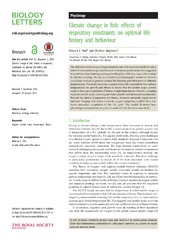Climate change in fish: effects of respiratory constraints on optimal life history and behaviour
Peer reviewed, Journal article
Published version
Permanent lenke
https://hdl.handle.net/1956/10431Utgivelsesdato
2015Metadata
Vis full innførselSamlinger
Originalversjon
https://doi.org/10.1098/rsbl.2014.1032Sammendrag
The difference between maximum metabolic rate and standard metabolic rate is referred to as aerobic scope, and because it constrains performance it is suggested to constitute a key limiting process prescribing how fish may cope with or adapt to climate warming. We use an evolutionary bioenergetics model for Atlantic cod (Gadus morhua) to predict optimal life histories and behaviours at different temperatures. The model assumes common trade-offs and predicts that optimal temperatures for growth and fitness lie below that for aerobic scope; aerobic scope is thus a poor predictor of fitness at high temperatures. Initially, warming expands aerobic scope, allowing for faster growth and increased reproduction. Beyond the optimal temperature for fitness, increased metabolic requirements intensify foraging and reduce survival; oxygen budgeting conflicts thus constrain successful completion of the life cycle. The model illustrates how physiological adaptations are part of a suite of traits that have coevolved.

